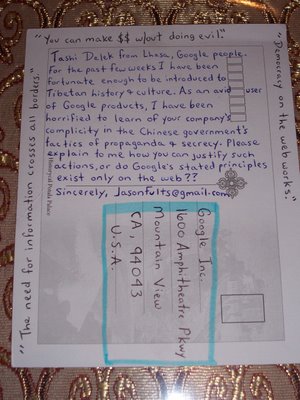
In recent weeks, my travels have led me to an unexpectedly heavy dose of Tibetan culture and Buddhism, mostly thanks to my pal and fellow expat Hotfoot, who's spent a significant amount of time volunteering in the Tibetan settlement community in McLeod Ganj, India and studying the Tibetan language. Along the way, I've learned about torture and imprisonment of Tibetans at the hands of the Chinese government, seen artwork created by young Tibetan children filled with violent imagery that should never exist in a child's mind, and was fortunate enough to be in the presence of the Dalai Lama, who, along with other leaders of Tibetan Buddhism, has been forced to flee his homeland.
Shortly after leaving McLeod, I traveled through Tibet--part of a larger trip from Delhi to Beijing. I chronicled my experiences somewhat, also online, and would be happy to share those with anyone who's interested. In Tibet, I visited numerous holy sites, and also experienced firsthand the police-state atmosphere that exists there. One conspicuous absence is the lack of photos of the Dalai Lama anywhere--apparently they've been banned. In McLeod, every shop I went into had his photo on the wall; but when I bought some books and scrolls there with the DL's picture and quotes on them, I was warned not to bring them into China.
Another strange phenomenon, especially for anyone who might be interested in reading more about the relationship between Tibet and the People's Republic, involves the internet. As I was considering taking the new Lhasa-->Beijing train, I wanted to do a bit more reading on the human rights organization Free Tibet's objections to it. Interestingly, I wasn't able to access their website from within China. Nor was I able to access a number of other sites that might be considered objectionable from the standpoint of Chinese authoritarian orthodoxy. It turns out that while China may very well be modernizing with respect to communications technology (there are internet cafes in any decent-sized city, and these are mostly swamped with Chinese youth playing online video games), they are most certainly not "Westernizing," at least with respect to values such as free speech. See this brief article, "The Great Firewall of China," for more details (though again, good luck accessing it from within China). As author Richard Taylor states in the article, "China is proof that the net can be developed and strangled all at once." [Another great article to take a look at appeared in the NYT a few months back (thanks, Molly!). And here's an interesting report by the OpenNet Initiative.]
Aiding in this simultaneous development and strangulation are companies such as Microsoft, Yahoo, and Google, all Western-based but with a huge financial stake in accessing Chinese markets. The first two--Microsoft and Yahoo--were frankly no surprise, as they're big-money corporates from way back. But Google, a hip modern company which markets itself with slogans such as "You can make money without doing evil," "Democracy on the web works," and "The need for information crosses all borders," has apparently been neglecting a few border-crossings as of late.
According to Free Tibet, who is calling for a boycott of Google products, "In January 2006 Google announced that it is to capitulate to political pressure from China and provide a web-based search engine for the Chinese market that will prohibit access to information about Tibet and other sensitive political issues, such as Taiwan and the protests in Tiananmen Square in 1989." I've been trying real hard to imagine the initial interactions between representatives from Google and the People's Republic. It must have felt a bit awkward, perhaps even embarrassing, for Google to be systematically figuring out how they would build customer loyalty amongst the Chinese while simultaneously preventing their access to such important information. A more recent article from the Sydney Morning Herald indicates that they may be having second thoughts about their capitulation, and I hope they'll act on those twinges of guilt.
As an avid user of Google products, such as Gmail and, obviously, Blogger, I'm having a few twinges myself. As such, I sent Google a postcard from Lhasa, pictured above, and am awaiting an appropriate response. Until I get one, or until they take it down, the postcard will remain here for other potential Google customers to see.
For further information regarding internet censorship and what we can do to fight back, check out this new campaign from Amnesty International
POSTSCRIPT:
This morning, just before posting this essay, I received an email from Google in response to my postcard. Strange coincidence. Here is their response, in its entirety:
"Hi Jason,
Thank you for contacting us about Google.cn. We launched Google.cn for our users in the People's Republic of China who want to search and browse in Simplified Chinese. Making our site available to millions of users in
their preferred language is a critical part of our mission to organize the world's information and to make it universally accessible and useful.
At first, Google.cn will serve Google Web Search, Google Image Search, Google Maps, and Google News. Over time, we'll provide more Google services tailored for the China market. In launching Google.cn, we aim to
balance three important values: users' interests, expanding access to information, and responding to local conditions in the markets we serve. Prior to this launch, many users in China were unable to access our site,
and those who were able to access it often experienced persistent latency, delay, and time-out issues. With Google.cn, users can now access much more information, much more quickly.
As you may know, to operate a web service in China, we must remove a small percentage of content from the search results available on Google.cn. The decision to do that was not an easy one for Google, in light of our
mission "to organize the world's information and make it universally accessible and useful." After a long process of study, analysis, and debate about the many technical, business, and ethical considerations, we concluded that the best available option was to provide our Chinese users with a search service that, while filtered, will be faster, more reliable, and, overall, more comprehensive than what's available today. Given the current filtering that's performed on the entire internet in China, Google.cn will provide no less information than would otherwise be
available. In fact, we believe that our advanced, innovative search technologies will make a noticeable net increase in the amount of information accessible to our Chinese users.
So, while removing this content may seem inconsistent with our mission, we believe that Google.cn will significantly improve the user experience and increase the overall accessibility of information in China. Our view is that providing as much information as possible is better than providing no information at all -- or providing such a heavily degraded user experience that it basically amounts to no information. Moreover, we think it's important to give users some meaningful disclosure whenever some results have been removed; in those cases, Google.cn clearly presents a message that says, "In response to local laws, regulations, or policies, one or more search results do not appear." It's also worth noting that Google.com will continue to be available, unfiltered, for all internet users worldwide, including those in China.
China is developing rapidly, thanks in no small measure to the internet. We firmly believe that with Google's culture of innovation, we can make meaningful and positive contributions to the already impressive pace of
development in China.
We appreciate your interest in Google and your taking the time to share your concerns with us.
Regards,
The Google Team"

No comments:
Post a Comment